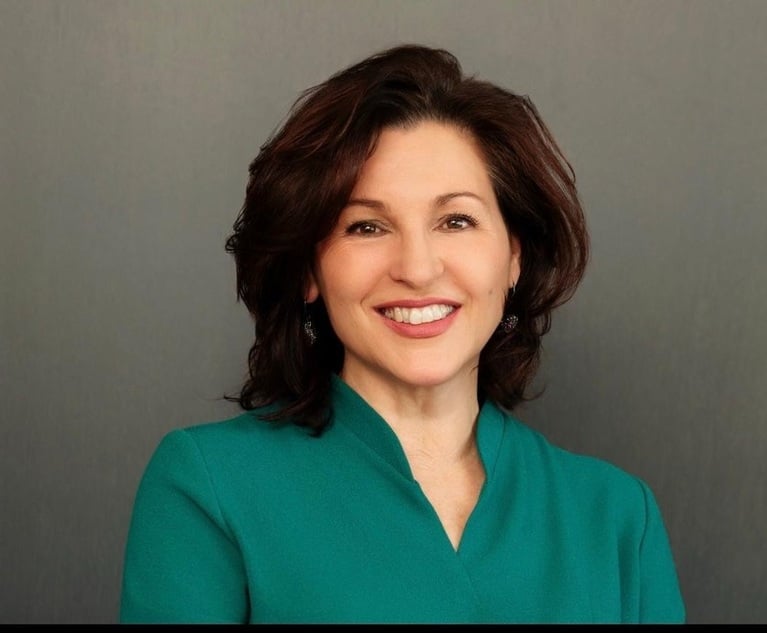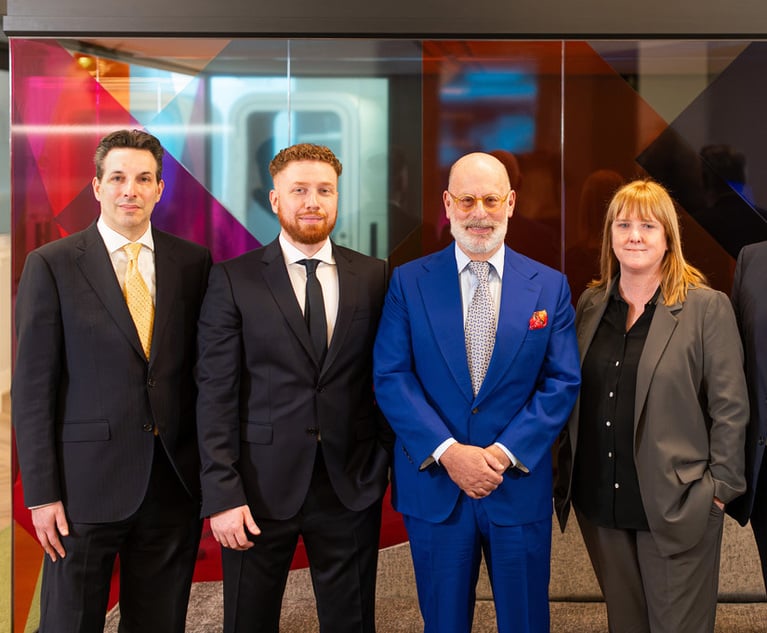LLP filings show rapid growth of alternative legal centres at HSF
Firm's eight centres have grown revenue by 90% in recent years and have worked with almost all its top clients
February 04, 2019 at 11:18 AM
3 minute read
Herbert Smith Freehills' alternative legal centres have almost doubled in size in recent years, according to the firm's latest accounts, which display the rapid growth of such operations.
Revenues for the eight centres, which provide cheaper and more efficient legal and technology services, increased to £38m in the 2017-18 financial year, a 90% increase from 2012.
Last year, the turnover from the operations grew by 13% and they worked with three quarters of the business's top 100 clients, according to the division's global head and partner Libby Jackson.
She added that so far this financial year, the business has worked with 84% of those clients and that more partners than ever are engaging with the network.
The firm currently operates eight such offices in locations such as Belfast, Shanghai, Melbourne and Johannesburg, with the South African base doubling its fee-earner headcount to 27 since it launched in 2017, according to Jackson.
HSF will launch an alternative legal centre in New York – its first in the US – in April, with about nine legal technologists.
The Anglo-Australian firm has heavily invested in technology in recent years and spent £36m on it during 2017-18, which included the cost of implementing its new business system.
Elsewhere in the accounts, it emerged that the firm's key management personnel took home £9.3m in the last financial year, 9% more than the previous year.
The figure is an uplift from the £8.5m the group pocketed in 2016-17, with the firm attributing the rise to its 12% profit growth during the year.
The firm's highest-paid earner pocketed £1.7m, a slight rise compared to last year's £1.6m figure.
Staff costs at the firm stayed flat at £401m, with staff salaries accounting for £361m of that figure, up from £357m during 2016-17.
That increase came despite staff headcount dipping from 4,248 to 4,110 during the year.
The firm's total number of partners also fell from 374 to 347, while fee-earners dropped from 2,444 to 2,397.
HSF's operating profit rose from £248m to £254m during the year, which saw its profit per equity partner jump from £760,000 to £852,000 alongside flat revenue growth.
CEO Mark Rigotti previously highlighted the firm's continental European offices as having been particularly financial successful during the year, with the firm intending to expand its reach in the jurisdiction.
This content has been archived. It is available through our partners, LexisNexis® and Bloomberg Law.
To view this content, please continue to their sites.
Not a Lexis Subscriber?
Subscribe Now
Not a Bloomberg Law Subscriber?
Subscribe Now
NOT FOR REPRINT
© 2025 ALM Global, LLC, All Rights Reserved. Request academic re-use from www.copyright.com. All other uses, submit a request to [email protected]. For more information visit Asset & Logo Licensing.
You Might Like
View All
Hengeler Advises On €7B Baltica 2 Wind Farm Deal Between Ørsted and PGE
2 minute read

A&O Shearman To Lose Another Five Lawyers, Including Madrid Practice Head, to EY
3 minute read
Rosenblatt Breaks Away From RBG, Becomes 40-Strong Standalone Firm
Trending Stories
- 1The Law Firm Disrupted: Scrutinizing the Elephant More Than the Mouse
- 2Inherent Diminished Value Damages Unavailable to 3rd-Party Claimants, Court Says
- 3Pa. Defense Firm Sued by Client Over Ex-Eagles Player's $43.5M Med Mal Win
- 4Losses Mount at Morris Manning, but Departing Ex-Chair Stays Bullish About His Old Firm's Future
- 5Zoom Faces Intellectual Property Suit Over AI-Based Augmented Video Conferencing
Who Got The Work
J. Brugh Lower of Gibbons has entered an appearance for industrial equipment supplier Devco Corporation in a pending trademark infringement lawsuit. The suit, accusing the defendant of selling knock-off Graco products, was filed Dec. 18 in New Jersey District Court by Rivkin Radler on behalf of Graco Inc. and Graco Minnesota. The case, assigned to U.S. District Judge Zahid N. Quraishi, is 3:24-cv-11294, Graco Inc. et al v. Devco Corporation.
Who Got The Work
Rebecca Maller-Stein and Kent A. Yalowitz of Arnold & Porter Kaye Scholer have entered their appearances for Hanaco Venture Capital and its executives, Lior Prosor and David Frankel, in a pending securities lawsuit. The action, filed on Dec. 24 in New York Southern District Court by Zell, Aron & Co. on behalf of Goldeneye Advisors, accuses the defendants of negligently and fraudulently managing the plaintiff's $1 million investment. The case, assigned to U.S. District Judge Vernon S. Broderick, is 1:24-cv-09918, Goldeneye Advisors, LLC v. Hanaco Venture Capital, Ltd. et al.
Who Got The Work
Attorneys from A&O Shearman has stepped in as defense counsel for Toronto-Dominion Bank and other defendants in a pending securities class action. The suit, filed Dec. 11 in New York Southern District Court by Bleichmar Fonti & Auld, accuses the defendants of concealing the bank's 'pervasive' deficiencies in regards to its compliance with the Bank Secrecy Act and the quality of its anti-money laundering controls. The case, assigned to U.S. District Judge Arun Subramanian, is 1:24-cv-09445, Gonzalez v. The Toronto-Dominion Bank et al.
Who Got The Work
Crown Castle International, a Pennsylvania company providing shared communications infrastructure, has turned to Luke D. Wolf of Gordon Rees Scully Mansukhani to fend off a pending breach-of-contract lawsuit. The court action, filed Nov. 25 in Michigan Eastern District Court by Hooper Hathaway PC on behalf of The Town Residences LLC, accuses Crown Castle of failing to transfer approximately $30,000 in utility payments from T-Mobile in breach of a roof-top lease and assignment agreement. The case, assigned to U.S. District Judge Susan K. Declercq, is 2:24-cv-13131, The Town Residences LLC v. T-Mobile US, Inc. et al.
Who Got The Work
Wilfred P. Coronato and Daniel M. Schwartz of McCarter & English have stepped in as defense counsel to Electrolux Home Products Inc. in a pending product liability lawsuit. The court action, filed Nov. 26 in New York Eastern District Court by Poulos Lopiccolo PC and Nagel Rice LLP on behalf of David Stern, alleges that the defendant's refrigerators’ drawers and shelving repeatedly break and fall apart within months after purchase. The case, assigned to U.S. District Judge Joan M. Azrack, is 2:24-cv-08204, Stern v. Electrolux Home Products, Inc.
Featured Firms
Law Offices of Gary Martin Hays & Associates, P.C.
(470) 294-1674
Law Offices of Mark E. Salomone
(857) 444-6468
Smith & Hassler
(713) 739-1250









